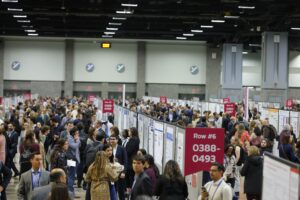For me, few ACR events bring home our connection as a rheumatology community more than our annual meeting, ACR Convergence. In addition to its many important opportunities for networking and education, one aspect of the meeting that always inspires me is the research. Research represents one of the three priorities of my presidential term because of its centrality to innovations that can improve the lives of our patients. The research spectrum is diverse and includes clinical, translational, basic science and health services disciplines, all of which are interconnected and essential. Many critical steps are involved in the effective conduct of all research: training people to perform the research, resources to support it, funding to conduct it and avenues to disseminate the results where they may impact clinical practice and stimulate the next level of investigation. The ACR recognizes the important role that each step plays in the research process and supports research of all disciplines through a diverse range of initiatives.
Learning Research
Conducting research is an acquired skill, and mentorship and learning occur throughout one’s career. The ACR/ARP Committee on Research (COR) has developed a wide range of initiatives to support the investigational pipeline:
- Creating Adult Rheumatology Mentorship in Academia (CARMA) is a mentoring program to support early career investigators. Through this program, junior investigators are matched with established rheumatologists to enhance decision making and satisfaction as they transition to independence after fellowship;
- Rheuminations on Research Careers is a virtual program that provides an opportunity for researchers at all career levels to discuss successes and challenges in an environment that encourages constructive feedback and shared experiences;
- The Rheumatology Research Workshop, next scheduled for spring 2025, is a two-day, in-person workshop that promotes interaction among rheumatology trainees, early career investigators and established investigators to foster collaboration and facilitate career mentoring;
- At ACR Convergence, the Basic & Clinical Research Conference is offered as a pre-meeting course and provides valuable opportunities for networking and idea generation between investigators of all experience levels; and
- The COR’s Early Career Investigator Subcommittee organizes a Meet the Funders program at ACR Convergence, where early career investigators can learn more about research opportunities, grant applications and funding strategies.
Watch a video in which Dr. Langford talks more about the importance of research and the ACR’s support for it.
Resources for Research
The RISE registry is the first and largest electronic health record (EHR) enabled rheumatology registry in the U.S. Overseen by the ACR Committee on Registries and Health Information Technology, RISE is a repository of clinical information that is collected during routine clinical care through EHR systems. To date, RISE data represent 3,524,519 patients with 37,755,997 individual encounters. RISE not only assists clinicians in meeting government-mandated reporting requirements, but it also provides a rich source of data that can be used to answer novel research questions. Information from RISE has been used in more than 80 research studies so far.




